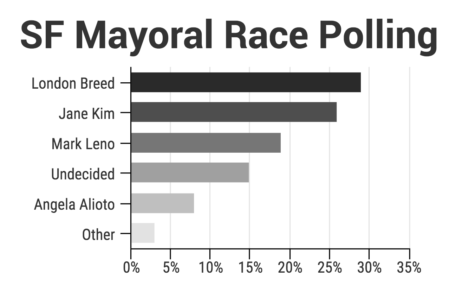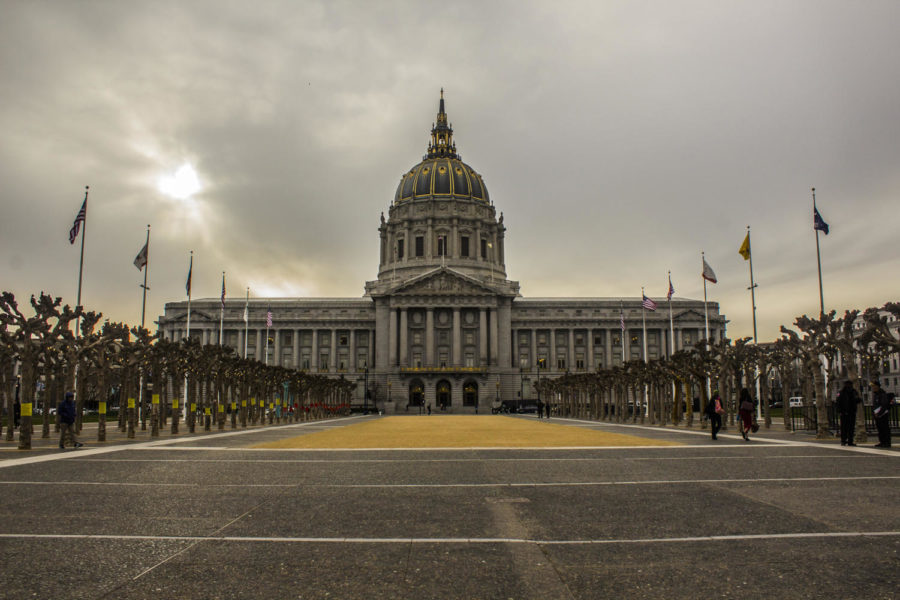San Francisco mayoral candidates share their visions for the city
Phoebe Grandi, Head of Photography.
Civic Center Plaza on Feb. 20, 2018.
In the wake of former San Francisco Mayor Ed Lee’s unexpected death in December 2017, a special election for mayor will be held this coming June. With eight candidates, including prominent city politicians like London Breed and Jane Kim, the mayoral race has brought a slough of politically inclined individuals into the public eye. The Urban Legend spoke with three mayoral hopefuls about their visions for the city if elected, as well as how young people fit into those visions.
Candidate Amy Weiss is a community organizer who moved to NoPa (North of the Panhandle Neighborhood) after getting a degree from San Francisco State University in Organizational Development and Training. Throughout the interview, Weiss’ fondness for the city was apparent. Discussing her move to NoPa, Weiss said “I liked saying that I lived north of a park. I grew up in San Jose, where you describe where you live in relation to the closest mall.”
Weiss put forward three areas for immediate action: fighting the homeless encampment crisis by creating transitional villages, creating additional affordable housing by building additional units in existing structures, and creating incentives for property owners to fill vacant storefronts.
All of Weiss’ solutions shared the common threads of partnership and cooperation between the city, neighborhood organizations, and individuals.
Another candidate, Mark Leno, has a background in both local and state government. He was on the San Francisco Board of Supervisors in the late 1990s before serving in the State Assembly and State Senate. “I bring those years of experience and accomplishment to this race and potentially to the mayor’s office,” he said.
Leno’s primary goal is the construction of affordable housing. For him, building affordable housing is “important because we need to make sure that those who are just coming into adulthood will be able to afford to live in the city in which they grew up,” he said.
He also emphasized fighting the homelessness crisis.“We need to do a much better job of attending to those who are living on our streets unsheltered, dealing with mental health issues untreated, as well as [dealing with] addiction to drugs and alcohol,” he said.
Leno is currently one of the most popular candidates according to a poll conducted by Public Policy Polling in December of 2017.

Infographic of polling on upcoming mayoral special election in San Francisco conducted between Feb. 22 and Feb. 28. Margin of error: ± 4.6%, Sample size: 462. Source: Fairbank, Maslin, Maullin, Metz & Associates.
Candidate Michelle Bravo, a former US Marine and a holistic health practitioner, also emphasized fighting the homelessness crisis. “It’s time to take a hard-line approach to this issue,” she said.
In order to combat this crisis, Bravo proposes additional support for Navigation Centers, which are already-existing city-run shelters that help connect homeless people to housing and jobs, as well as the creation of a holistic health institute for mentally ill people living on the street.
Bravo believes that her experience as a health practitioner will be relevant to serving as mayor. “I help people heal, and our city needs to heal big-time right now,” Bravo said.
In terms of issues that specifically address young people, both Weiss and Leno support bringing back Vote16, a 2016 ballot initiative that aimed to lower the voting age to 16 for local and school board elections. “We need to engage young people to get them involved with our democratic process,” Leno said.
“If people learn at a young age how to participate in democracy it’s more likely that they’re going to be doing this for the rest of their life,” Weiss said.
However, it’s difficult to know how much power the mayor would have to lower the voting age.
Media coverage about the election so far has been minimal. However, one article was published in the San Francisco Chronicle discussing different candidates’ views on arming San Francisco police with tasers, which they do not currently carry.
When discussing this issue, Weiss said that “a lot of people think that tasers are non-lethal and they’re not a problem, but….you can kill someone with a taser.”
Leno also expressed concerns about tasers. Particularly since the SFPD is currently implementing reforms focused on de-escalation, “use of a new weapon does not take us in that direction,” Leno said.
Bravo invoked San Francisco’s values in her critique of tasers. “San Franciscans are being known for being more evolved, more heart-centered, and tasers are known to stop the heart,” she said.
The mayoral election notwithstanding, Weiss emphasized the importance of being engaged in local politics. National politics, she said, have “less bearing on your life in certain ways than it does to vote for your mayor, or your supervisor, or on… local laws and initiatives.”
Leno focused on the significance of young people’s participation in democracy. “Student voice can be very powerful,” he said, “in fact, it has a history of changing the world.”












